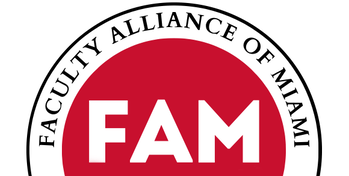On November 17, faculty and students welcomed finance expert and CPA Dr. Howard Bunsis for an exhilarating, witty deep-dive into Miami University’s finances.
Co-sponsored by FAM and #StudentsForFAM, “Follow the Money: Miami’s Finances & You” covered Miami’s overall financial condition, spending on instructional and administrative salaries, faculty pay as compared to our peers, enrollments, athletics deficits, and more. Here’s a short summative clip :
“There’s no doubt Miami is in very strong financial condition…solid reserves, cash flows, modest debt…”—Howard Bunsis
More clips below. Watch the full recording on YouTube and explore the slides.
Bunsis’ findings:
- Miami University is in very strong financial condition. This conclusion is supported by solid reserves and cash flows, modest debt levels, and increasing state support.
- There are significant transparency issues at MU, as data that is publicly available at most universities is not available for Miami
- The bond rating of MU is Aa3 stable, which Moody’s supports by noting solid reserves and state support
- There was a decline in auxiliary revenue (housing, dining, parking, athletics) from 2019 to 2021, but total revenues were relatively stable, as COVID support and the state helped.
- There is an issue with high administrative costs when viewed over time, by campus, and versus peer institutions
- Faculty salaries are well below peers at all campuses.
- MU Athletics had a huge deficit in 2021, but there were huge deficits even before the pandemic.
Some highlights from the presentation:

Miami’s transparency issues: “They act like they’re a small private university”
FAM and #StudentsForFAM are grateful to Professor Bunsis for his time. Bunsis is an accountancy scholar and attorney with many years of experience analyzing university finances for the American Association of University Professors. Howard holds a PhD and MBA from the University of Chicago, a JD from Fordham University, and a BA from the University of Pennsylvania. He is professor of accounting at Eastern Michigan University, where he has served as president of the AAUP collective bargaining chapter. He is easy to find and mentioned that he’s happy to answer questions about his data and conclusions.









Leave a Reply